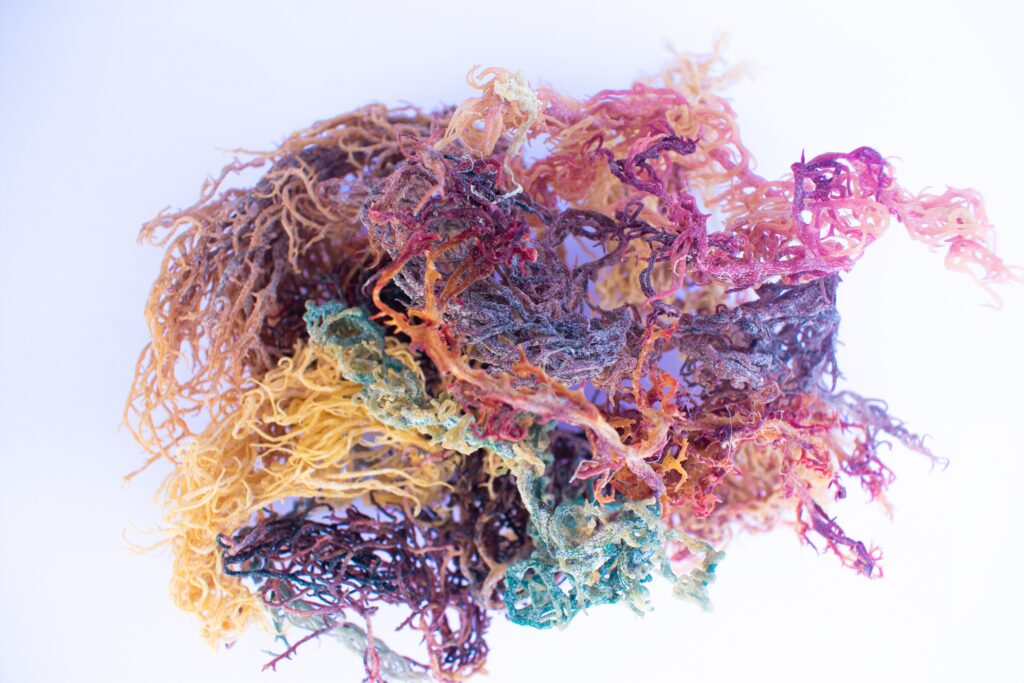The scientific name for sea moss, Chondrus crispus, is a kind of algae or seaweed that grows along the Atlantic coasts of Europe, the Caribbean, and North America. Although it is commonly seen in a variety of colours, including yellow, gold, and purple, it is sometimes known as a red alga. Less common colours include blue and green.
Sea moss is well-known for a number of possible health benefits that could support a healthy lifestyle because of its low calorie and fat content. It offers a small quantity of protein and a variety of vitamins and minerals in addition to being an excellent source of iodine and antioxidants.
It is said that 92 of the 102 minerals that our body requires to function are naturally present in sea moss. Although sea moss is undoubtedly extraordinarily rich in minerals, these figures aren’t entirely reliable.
Each mineral’s presence and precise concentration differ significantly between plants and are influenced by the growing conditions of sea moss. It is crucial to realise that not every sea moss plant has all 92 minerals. Minerals in the water that sea moss grows in are absorbed by it. As a result, compared to sea moss collected in the wild, sea moss cultivated in pools (also known as fake sea moss) has substantially less minerals.
The following 12 important minerals are present in sea moss in considerable proportions (average content) in a 10 g serving:
- Calcium: 7.2 mg

- Copper: 0.02 mg
- Iodine: 47 µg
- Iron: 0.89 mg
- Manganese: 0.037 mg
- Magnesium: 14.4 mg
- Phosphorus: 15.7 mg
- Potassium: 6.3 mg
- Selenium: 0.07 µg
- Sodium: 6.7 mg
- Sulfur: data not found
- Zinc: 0.195 mg
Top 10 possible health advantages of sea moss:
It might aid in the functioning of your digestive system.
Live bacteria and fibre found in sea moss are proven to promote digestive health.
It might help your thyroid.
Iodine, which is found in sea moss, is beneficial to the thyroid and may aid with weight loss. However, it’s definitely worthwhile to look into this more if you’re already taking medicine to support your iodine deficiency.
You might have increased energy as a result.
Iron is found in sea moss and is a fantastic nutrient to support your energy levels. You may feel drained and listless if you don’t get enough iron.
It might support skin nourishment.
Magnesium, vitamin A, vitamin K, and omega-3 fatty acids found in sea moss hydrate and promote the proper function of skin cells.
It might strengthen your immunity.
Although no specific research on humans has been done, a study on salmon found that sea moss may support the development of the immune system.
It’s believed to improve your mood.
Approximately twice as much potassium is found in sea moss as in a typical banana. An essential mineral that promotes mental and emotional well-being is potassium.
It might improve the health of your heart
Sea moss may help thin the blood and decrease cholesterol, according to certain research. Still unproven, this calls for additional human investigation.
It might aid in blood sugar regulation
Fucoxanthin, a substance found in seaweeds like sea moss, is supposed to normalise elevated blood sugar levels.
It is said to have aphrodisiac properties
Sea moss has long been used by people from the Caribbean as a natural aphrodisiac. It is believed that the high zinc content in it raises sex hormones, which are important for desire.
It might promote your general well-being and health
Rich in minerals and nutrients, sea moss is a potent superfood that may support a healthy body.
But it’s important to keep in mind that not all of the nutrients you require can be found in sea moss, and there hasn’t been much research done on its advantages. If you’d like, include sea moss as a supplement to your healthy, well-balanced diet.
Conclusion:
Since sea moss is available in so many forms—from powder to whole—there are numerous ways to incorporate it into your diet. Sea moss gel is one of the most widely used kind these days. Derived from sea moss, sea moss gel is occasionally used in food, medical, and cosmetic products as a thickening or stabilising agent. Because sea moss gel is rich in minerals like potassium and iodine, it has all the same wonderful benefits as sea moss.16

Its subtle taste renders it an adaptable component for your pantry. Sea moss is a great addition to ice cream, cakes, baked goods, soups, stews, shakes, jams, and spreads.
Clearly Sea moss promotes overall health. Being rich in vital vitamins & minerals makes it a great addition to ones health & wellbeing.
If you are interested to purchase some raw organic Sea moss or if you would like pre-made Sea moss gel then visit our online shop.
Thanks – Written by Ashley North
Furthermore, the presence of these 80 minerals and elements in sea moss may vary based on the type of water it has grown in:
- Actinium
- Aluminum
- Americium
- Antimony
- Argon
- Arsenic
- Astatine
- Barium
- Berkelium
- Beryllium
- Bismuth
- Bohrium
- Boron
- Bromine
- Cadmium
- Cesium
- Californium
- Carbon
- Cerium
- Chlorine
- Chromium
- Cobalt
- Curium
- Dubnium
- Dysprosium
- Einsteinium
- Erbium
- Europium
- Fermium
- Francium
- Gadolinium
- Gallium
- Germanium
- Gold
- Hafnium
- Hassium
- Helium
- Holmium
- Hydrogen
- Indium
- Iridium
- Krypton
- Lanthanum
- Lead
- Lithium
- Lutetium
- Mercury
- Molybdenum
- Neodymium
- Neon
- Neptunium
- Nickel
- Niobium
- Nitrogen
- Osmium
- Palladium
- Platinum
- Plutonium
- Polonium
- Praseodymium
- Promethium
- Protactinium
- Radium
- Radon
- Rhenium
- Rhodium
- Rubidium
- Ruthenium
- Samarium
- Scandium
- Silicon
- Silver
- Strontium
- Tantalum
- Technetium
- Tellurium
- Terbium
- Thallium
- Thorium






